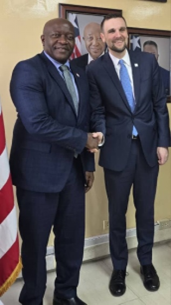The Millennium Challenge Corporation (MCC), a U.S. foreign aid agency, is currently evaluating Liberia’s eligibility for a second compact, a large-scale grant program designed to stimulate economic growth and reduce poverty. Following a review of Liberia’s performance by the U.S. State Department, the MCC Board of Directors convened on August 21, 2025. The Board deferred a final decision on Liberia’s eligibility until its regular December 2025 meeting. This delay signifies the MCC’s commitment to a thorough and deliberate process, ensuring that any future compact aligns with both U.S. and Liberian development priorities. The interim period will allow for further assessment and collaborative planning between the MCC and the Liberian government.
In a letter dated August 22, 2025, Jason Small, MCC’s Acting Vice President for Compact Operations, communicated the Board’s decision to Augustine Kpehe Ngafuan, Liberia’s Minister of Finance & Development Planning. Small emphasized that the MCC’s ongoing engagement with Liberia will focus on identifying key sectors for potential investment under a second compact. This collaborative approach will allow the MCC and Liberia to jointly determine areas where a compact could most effectively stimulate economic growth, create opportunities for U.S. businesses, and generate mutual benefits for both countries. The letter also reiterated the MCC’s commitment to partnering with Liberia and its appreciation for the strong relationship between the two entities.
The MCC’s decision to further evaluate Liberia’s eligibility underscores the agency’s focus on performance-based aid. Compacts are awarded to countries that demonstrate a commitment to good governance, economic freedom, and investment in their citizens. The upcoming discussions between the MCC and the Liberian government will delve into specific sectors that hold the greatest potential for transformative impact and sustainable development. These discussions will provide a platform for Liberia to showcase its progress and outline its vision for future economic development, ultimately informing the MCC Board’s final decision in December.
To facilitate these crucial discussions, the MCC plans to send a team to Liberia. This on-the-ground engagement will provide the MCC with firsthand insights into Liberia’s development landscape and allow for more in-depth consultations with government officials, civil society organizations, and other stakeholders. The timing of the visit will be determined through mutual agreement, ensuring that both parties are adequately prepared for productive discussions. This collaborative approach is essential for developing a compact that is tailored to Liberia’s specific needs and priorities, maximizing its potential for positive impact.
Minister Ngafuan responded to Mr. Small’s communication with gratitude for the update and expressed President Boakai’s and the Liberian government’s appreciation for the MCC’s continued support. He welcomed the MCC’s decision to send a team to Liberia and emphasized the government’s eagerness to engage in discussions regarding potential sectors for a second compact. This proactive stance highlights Liberia’s commitment to securing a second compact and its recognition of the potential benefits associated with MCC funding. The minister’s prompt response and enthusiastic welcome underscore the importance Liberia places on its partnership with the MCC.
The exchange between the MCC and the Liberian government signifies a significant step in the process of determining Liberia’s eligibility for a second compact. The upcoming discussions and the subsequent visit by the MCC team will play a crucial role in shaping the future of development cooperation between the two countries. The outcome of the December Board meeting holds significant implications for Liberia’s economic development trajectory, demonstrating the importance of performance-based aid in fostering sustainable growth and poverty reduction. The collaborative spirit and open communication between the MCC and Liberia bode well for a productive partnership and the potential for a second compact to contribute significantly to Liberia’s future prosperity.


